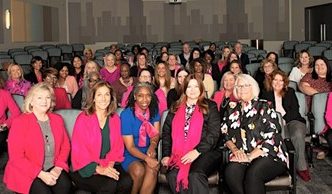A stronger than expected voter turnout led to a “wild midterm election” yesterday with official results pending. Although all of the candidates endorsed by the LSCU in the Alabama and Florida races are projected to win, our work is only beginning. A new season of advocacy begins now to educate our lawmakers on critical credit union issues. These include, but are not limited to, maintaining the tax-exempt status, clarity on ADA website compliance, the need for stronger merchant data breach requirements, credit union exemption from rulemaking authority under the Bureau of Consumer Financial Protection, and regulatory relief.
Alabama Elections
Since the Republican takeover of the Alabama Legislature in 2010, the state has been solidly in that party’s corner, and Tuesday night’s election didn’t do anything to change that direction. Republicans easily won all statewide offices, seats on the Supreme Court, and continue to hold all seats in the U.S. House of Representatives save one. Also, the Alabama Legislature remains in the hands of Republicans as both the House and Senate retained their super majority. One interesting note on the legislature is the number of new members that will be traveling to Montgomery for the 2019 Legislative Session.
There will be 27 new members of the House and 12 new members of the Senate, and while some of those Senators are former House members, these numbers closely resemble that of the Republican landslide of 2010 with 28 percent of the Alabama Legislature serving their first term in their respective houses. Once the dust settled after some late-night vote counting, the preliminary results are listed below:
The balance of power in Congress:
U.S. House of Representatives – 230 Democrats, 205 Republicans
U.S. Senate (4 seats still undecided) – 51 Republicans, 45 Democrats
Official numbers for Congressional races:
District 1 – Byrne(R) 63% Kennedy(D) 37%
District 2 – Roby(R) 62% Isner(D) 39%
District 3 – Rogers(R) 64% Hagan(D) 36%
District 4 – Aderholt(R) 80% Auman(D) 20%
District 5 – Brooks(R) 61% Joffrion(D) 39%
District 6 – Palmer(R) 69% Kline(D) 31%
District 7 – Sewell uncontested
The balance of power in the Alabama Legislature:
Alabama House of Representatives – 77 Republicans, 28 Democrats
Alabama Senate – 27 Republicans, 8 Democrats
Official numbers for notable statewide offices:
Governor – Ivey(R) 59.6% Maddox(D) 40.4%
Lt. Governor – Ainsworth(R) 61.4% Boyd(D) 38.6%
Attorney General – Marshall(R) 58.9% Siegelman(D) 41.4%
Secretary of State – Merrill(R) 61.1% Milam(D) 38.9%
Auditor – Zeigler(R) 60.6% Joseph(D) 39.4%
Chief Justice – Parker(R) 57% Vance(D) 43%
Overall, 3/3 or 100 percent of League-endorsed Alabama candidates won their election:
Bradley Byrne for Congress (R-AL 1) – WON
Gary Palmer for Congress (R-AL 6) – WON
Marth Roby for Congress (R-AL 2) – WON
The Alabama Legislature has their organizational session in January and begin the 2019 session on March 5.
For an opportunity to meet with policymakers and advocate for the industry, register now for the 2019 Alabama Advocacy Conference in Montgomery, AL, March 19-20.
Florida Elections
For nearly two decades now, statewide candidates’ victories in Florida have been extremely close. Remember in 2000, George W. Bush vs. Al Gore? 2010, Rick Scott vs Alex Sink? 2014, Rick Scott vs Charlie Crist? 2016, Donald Trump vs Hillary Clinton? Razor-thin victories have become the norm in the Sunshine State, and the 2018 midterm elections certainly delivered.
One U.S. Senate seat, all Congressional seats, the Governor and Cabinet, half of the State Senate (20 seats) plus another two in special elections, and all 120 State House seats were on the Florida ballot this year.
In one of the most expensive midterm contests in the nation, Florida Gov. Rick Scott (R) appears to have defeated longtime U.S. Sen. Bill Nelson (D), although state law could trigger an automatic recount if the margin of victory is equal to or less than 0.50 percent of the total votes cast for that office. As of early this morning, the margin was 0.48 percent. Most congressional incumbents won their elections, with the exception of Rep. Curbelo (R) of Miami. Preliminary elections results indicate Democrats have claimed control of the House, and Republicans have expanded their majority in the Senate.
Tallahassee Mayor Andrew Gillum (D) conceded the governor’s race to Congressman Ron DeSantis (R) in one of the nation’s most highly watched races that morphed into an all-out brawl. It appears to be enough of a victory to fend off a recount, but in true Florida fashion, is only about a percentage point apart. The Florida cabinet will remain Republican-controlled with Jimmy Patronis holding on to the Chief Financial Officer post, Ashley Moody (R) elected to the Attorney General seat, and a narrow win by Matt Caldwell (R) for Commissioner of Agriculture.
In the Florida Legislature, Republicans retain the majority both chambers. While five state House seats were picked up by the Democrats this cycle, Republicans held on to their advantage 73-47. Republicans currently hold the majority in the Senate by a margin of 22 to 17. Depending on the outcome of a narrow Tampa election, the advantage may erode but only by one seat.
Additionally, Florida voters were faced with 12 constitutional amendment proposals on the ballot and each needed at least 60 percent of votes to be enshrined in the Florida Constitution. Of those 12 amendments, all of them passed except for one.
Here’s how LSCU & Affiliates-endorsed candidates fared:
Ron Desantis for Governor (R) – WON
Jimmy Patronis for Chief Financial Officer (R) – WON
Matt Gaetz for Congress (R – FL 1) – WON
Bill Posey for Congress (R – FL 8) – WON
Darren Soto for Congress (D – FL9) – WON
Gus Bilirakis for Congress (R – FL 12) – WON
Ross Spano for Congress (R – FL 15) – WON
Greg Stuebe for Congress (R – FL17) – WON
Overall, 100 percent of League-endorsed Florida candidates won their election yesterday. The League advocacy team has had a focus on strengthening relationships with policymakers and educating candidates on industry priorities over the course of the election cycle. These efforts will only intensify as lawmaker’s head to Tallahassee at the end of this month for Organizational Session and prepare for their committee week meetings leading up to the official start of Session in March.
Additionally, registration is now open for the 2019 Florida Advocacy Conference, scheduled for March 26-27 in Tallahassee, FL. This annual event is an excellent opportunity to meet and reconnect with your area lawmakers while advocating for industry specific legislative priorities.





